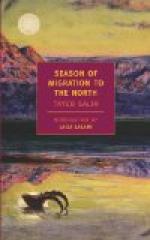Mrs. Ila-la-Rocko asked us into her hut, where we reclined on fur mats while the whole family, wreathed in smiles, tumbled over themselves to do us honour. One by one they danced for us, stopping to tell their names and to ask ours. “Major Jabussy,” “Missa Blown,” they got the names all right but applied them promiscuously, and then went into roars of laughter at their blunder. The merriment was infectious. Let no one waste further sympathy over the poor benighted Eskimo of this Canadian North. The Mackenzie River Eskimo is, with perhaps the one exception of an Arab I fraternized with in Chicago at the World’s Fair, the most splendid specimen of physical manhood I have ever seen; in physique he stood out in splendid contrast to the Europeans and Americans who were investigating him and his. Arrow-straight and six feet tall, mark him as he swings along the strand. His is the carriage and bearing of the high-bred Tartar. This man has “arrived”; he has an air of assuredness that in the drawing-rooms “Outside” you seldom see.
The Eskimo of the Arctic foreshore are of two tribes: the Kogmollycs to the east of the Mackenzie mouth, the Nunatalmutes, Dwellers in the Hills, or Deermen, originally from the interior to the West, but now for the great part making their home at Herschel Island, eighty miles from the Mackenzie delta, attracted there by the opportunity of working for the American whalers.
One of the striking figures of the North is Oo-vai-oo-ak, headman of the Kogmollycs, living in dignified happiness with his children and his two wives. This second wife was the cause of much comment among us. How did she happen? It was this way. Mr. Oo-vai-oo-ak married Mrs. Oo-vai-oo-ak the Elder when they were both young. Children were born to them, the big seal was plenty, succulent beluga-steaks graced the board, and the years followed one another as smoothly as glacial drift or the strip of walrus-blubber that the last baby drops down its red gullet as a plummet sinks in a well.
One day after a big hunt, as Mrs. Oo-vai-oo-ak placed before her lord the matutinal mess of whale-skin boiled to that particular rubber-boot consistency which was his taste, she said, “I’m not as young as I was, you entertain much, the household cares are heavy, I’d like you to get another wife to help me with the work.” Chief Oo-vai-oo-ak chewed upon the whale-skin and the suggestion of his spouse. Out in his kayak, dodging the icebergs, he turned it over in his mind for half a day; and as the outcome of his cogitations Mrs. Oo-vai-oo-ak the Younger, a rollicking and comely maiden, joined the family circle.




